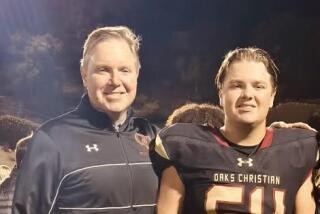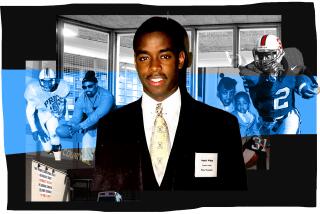Surviving Life’s Winding Road
- Share via
NORTHRIDGE — The coach who knows Kevin Singleton as a player and an assistant says he has figured out what makes Cal State Northridge’s new linebacker coach such a good teacher.
It’s nothing you would recommend to a friend.
“Kevin’s life experiences are just superior to most of ours,” Arizona football Coach Dick Tomey said. “He’s had the best and worst of it.”
At the height of Singleton’s life, he was a star linebacker at Arizona with an NFL career in his future. But the depths came just before his senior year, when he was diagnosed with leukemia, a potentially fatal cancer of the infection-fighting white blood cells.
Singleton’s life was saved because his identical twin brother, Chris, who also played at Arizona and went on to an NFL career, donated bone marrow for a transplant.
Singleton recovered quickly enough to make an attempt at his dream of playing in the NFL, with stops in the Arena and Canadian football leagues. Eventually, though, he came to grips with the fact that the disease had taken too much out of him.
Although the 6-foot-2, 245-pound mountain of muscle looked like he could handle anything, Singleton lacked the energy needed for pro football.
So he shifted his focus to coaching. After stops at his alma mater and a junior college, last week he started stomping around Northridge spring football practice, showing no shortage of energy as he chased his linebackers around the field.
Northridge Coach Jim Fenwick hand-picked Singleton, 30, because he knew football and because of what he had endured.
“Everyone I talked to said he’s a great guy,” Fenwick said. “And he’s a great role model. If any of our kids needs a lesson on courage, he’s a great guy to have around.”
*
Singleton grew up, first in Nebraska and then New Jersey, doing everything with twin brother Chris.
“We were always tight,” Kevin said. “We were inseparable.”
Whatever the season--baseball, football or basketball--they were teammates. They starred together as bookend linebackers at Parsippany (N.J.) High, attracting offers from major college football programs across the country. But any school that wanted one or the other was politely dismissed. They were a package deal.
The Singleton brothers eventually signed with Arizona, and by their sophomore seasons they were both starting. Tomey said both were NFL prospects after their junior seasons.
Kevin Singleton’s dream of playing professional football drove him to intense workouts in the summer of 1989, just prior to his senior season. As the summer wore on, Singleton began getting headaches, though he didn’t think much of them at the time. He was tired frequently, but figured that was because he was overworking himself.
One night in July, after dining out with his girlfriend, he became ill. Food poisoning, he thought. A few nights later, he was in the emergency room with a 104-degree fever. He also had an intense, burning pain near his right armpit.
“It felt like someone had stuck a hot iron in my arm,” he said.
The variety of symptoms caused the Arizona team physician to order a blood test. Singleton was shocked when he heard the results.
“Leukemia?” he asked. “Are you crazy, I’m in top shape. I had no idea what it was. All I knew was cancer causes death. . . .
“That was the day I found out I’m not invincible. I’m not a super hero. I’m not this superstar football player that nothing ever happens to. I’m a perfect example of someone having everything going right for them. I didn’t use drugs, didn’t drink, didn’t shoot people, didn’t rob people.
“I’m just someone that something happened to that changes the path of my life.”
Although Singleton didn’t know it at the time, his hopes of returning to football at a high level were over. What he faced was six months of torturous chemotherapy and radiation treatments, as doctors tried to kill the cancer cells coursing through his blood.
But he did not face the uneasy waiting that most leukemia patients endure while a match is sought for a bone-marrow transplant. Singleton’s match was right at his bedside, looking back at him like the image in a mirror.
Chris had 1 1/2 quarts of bone marrow removed through seven needles inserted into each hip. It was a simple operation, with little risk to his own football career. Chris was a first-round pick of the New England Patriots a few months after the surgery.
But that came only after spending every night in the hospital with his brother.
“Without a doubt, it was the scariest time of my life, of our lives,” Chris said. “I just never knew if he would recover or die.”
Kevin wasn’t sure either. Even with a perfect marrow match, curing leukemia is not guaranteed.
“Every day was a battle,” he said. “There were days I didn’t want to do it anymore. I wanted to quit, to go home.”
Singleton spent 40 consecutive days in the hospital, in enough pain to require morphine every four hours. He was too weak to get out of bed. His face was wrinkled “like a prune,” he said.
“It’s demoralizing,” he said. “You have no pride, no self-esteem in the hospital. You have no privacy. You can’t go to the bathroom by yourself.”
Singleton was released from the hospital on Feb. 21, 1990, the day after his 23rd birthday, but he still couldn’t lead a normal life. His new immune system was, in essence, that of a month-old infant. Singleton had to wear a surgical mask outside to protect him from germs. Crowds of people were, as far as his body was concerned, potentially devastating contagious illnesses.
In the first few years after his transplant, he contracted pneumonia three times, once serious enough to be hospitalized in intensive care.
Crazy as it seems--and Singleton admits it was--he kept trying to play football. As soon as he was able, he was in a weight room trying to get back in shape.
The NCAA granted Singleton, who used a redshirt season as a freshman, a sixth season of eligibility, and he returned to the Wildcats. He was a captain in 1990, but it was an honorary designation. Singleton barely got in games.
After the season, he tried out for a spring football league that folded and he played one game with the Albany Firebirds in the Arena Football League before he was cut.
He later landed in the Canadian Football League, on the practice roster of the Saskatchewan Roughriders in 1992 and the active roster in 1993. But he was released toward the end of the 1993 season.
By then Singleton had watched his brother play four seasons with the Patriots and Miami Dolphins--Chris remained with the Dolphins until he was released last month after his seventh pro season--and he yearned to play in the NFL himself.
“I thought I could go back to normal, and that’s where I was wrong,” Singleton said. “I couldn’t go back to normal because I had too many weaknesses. I look back and I say I should have just taken it easy, worked out and stayed healthy. Football, that was done.”
Playing football anyway.
Shortly after he was released by Saskatchewan, Singleton finished the season helping coach a high school team in Phoenix. While working as a security guard at another high school, he ran across one of his former Arizona coaches who told Singleton he should return to Tucson and help coach the Wildcats.
Singleton worked at his alma mater in 1994 as a graduate assistant, coaching and working toward a master’s degree in education. After two seasons there, he moved on to join another of his former coaches on the staff at Mesa (Ariz.) College.
Then Singleton got high-tech a few months ago, logging on to the Internet and downloading a list of college head coaching changes in the country. He sent his resume to each new coach, including Fenwick.
Within weeks, Fenwick called Singleton and offered him a job. Days later, Singleton accepted.
Singleton can teach in a classroom, but he’d rather not.
“I’m not a subject teacher,” he said. “I’m a life teacher. I talk about things that happen in the real world.”
And there’s one particular lesson he’d like everyone to learn.
“I think there’s always got to be a Plan B,” he said.
More to Read
Go beyond the scoreboard
Get the latest on L.A.'s teams in the daily Sports Report newsletter.
You may occasionally receive promotional content from the Los Angeles Times.










